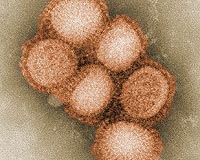| . |  |
. |
Copenhagen (AFP) Sept 15, 2009 Swine flu will have a "devastating effect" on poor countries where lives will be lost due to ill-equipped health care facilities, the World Health Organization warned on Tuesday. "The pandemic will test the world on the issue of fairness in a substantial way," WHO chief Margaret Chan said in a speech in Copenhagen where the body has its regional office for Europe. She noted that swine flu, also known as the A(H1N1) virus, will cause "manageable disruption" in affluent countries. But it will "almost certainly have a devastating impact in countries with few health facilities and staff, no regular supplies of essential medicines, little diagnostic and laboratory capacities, and vast populations with no access to safe water and sanitation," she said, calling it "a watershed event". Chan said the pandemic was occurring at a time when differences in the level of health care around the world were "greater than at any time in recent history". At least 3,205 people have died of the disease since it was uncovered in April, according to the organisation's latest tally.
earlier related report The EU executive arm encouraged cross-border sharing and sale of the vaccine as some European countries have ordered enough to vaccinate their entire population while people in some other EU nations are not yet as well provided for. If one country has full vaccine coverage and "a country next to it says (it can only provide for) 10 percent because it cannot afford any more... a lot of difficulties will arise from this," Health Commissioner Androulla Vassiliou told reporters in Strasbourg, France. Her department, in a statement issued ahead of an expected surge of European cases as the northern winter approaches, also urged that "the possibility of reserving for developing countries a share of vaccines ordered by member states should be seriously considered". "The European Union has a major role to play having the largest share of relevant vaccine production capacity and the greatest share of advance purchase agreements," for the vaccine which is not yet approved or available, the document continued. Any funding necessary to help poor nations obtain the vaccines could be found in existing aid and development finding, the EU health directorate said. Clinical trials have shown experimental vaccines against the potentially deadly A(H1N1) swine flu to be effective with one single shot, leaving the possibility that countries who have booked the vaccine from pharmaceutical companies expecting that two doses may be required will have surplus stock. The EU commissioner said she hoped to get a scientific opinion on vaccines from the European Medicines Agency by the end of the month. "We need to remain vigilant and continue to coordinate our preparations to respond to the pandemic in the months ahead," Vassiliou said in a statement. At least 3,205 people have died of the disease since it was uncovered in Mexico in April, according to the World Health Organisation's latest tally. So far the virus has hit one percent of the European Union's population of around half a billion people, with most cases no more serious than regular seasonal flu. That figure could reach up to 30 percent, according to experts. Share This Article With Planet Earth
Related Links Epidemics on Earth - Bird Flu, HIV/AIDS, Ebola
 Some swine flu victims contagious 8 days or more: studies
Some swine flu victims contagious 8 days or more: studiesSan Francisco (AFP) Sept 15, 2009 Some swine flu victims remain contagious more than eight days after their symptoms have vanished, much longer than expected, said two studies presented at a meeting of experts. Currently, US health authorities recommend that people who contract the A(H1N1) virus wait 24 hours after the fever has subsided before returning to their normal activities to avoid any risk of spreading the disease. ... read more |
|
| The content herein, unless otherwise known to be public domain, are Copyright 1995-2009 - SpaceDaily. AFP and UPI Wire Stories are copyright Agence France-Presse and United Press International. ESA Portal Reports are copyright European Space Agency. All NASA sourced material is public domain. Additional copyrights may apply in whole or part to other bona fide parties. Advertising does not imply endorsement,agreement or approval of any opinions, statements or information provided by SpaceDaily on any Web page published or hosted by SpaceDaily. Privacy Statement |